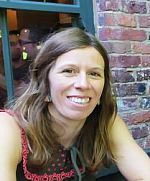 Vicky Bromley
Vicky Bromley
Vicky’s research investigates the phenomenon of the growth in female headed lone parent families who are moved into emergency homeless and temporary accommodation (EOTA) and asks how this phenomenon has affected the identity of the single mother. To ask how this point has been arrived at, Vicky considers the links between processes that actualise the marginalisation of single mothers, such as shaming and stigmatisation, alongside governmentality, the weaponisation of targeted rhetoric, and the use of disciplining neoliberal policy within the modern state. This combined analysis allows a ‘loop back’ to the identity construction of the lone mother living in EOTA. Originally conceived as study combining semi structured interviews and ethnography, the methodology has been adjusted in response to the Covid-19 pandemic, and Vicky has instead used online surveys and Zoom interviews to attain the data. Society has been heavily impinged on by the Covid-19 outbreak and this necessitates further analysis into how this group have been affected, as well as how the research project has similarly been adapted.
 Ella Delaine
Ella Delaine
Ella’s research focusses on Buddhist migrant minorities to explore the interplays between Western biomedical and non-Western spiritually-informed ideas around mental distress. The research project will explore how interactions with the Western environment – in terms of infrastructure, medical systems, religious and health beliefs – impact on Buddhist ethno-minorities’ understanding, management, and treatment of mental distress. A qualitative research methodology using semi-structured interviews and participant observation will be used, focussing on the Tibetan community in Switzerland and the Thai community in England. Comparing different Buddhist schools provides a better understanding of how Buddhism informs mental health beliefs and practices and the extent to which differences between schools of thought lead to variations in outcomes.
 Anna Ridgewell
Anna Ridgewell
Anna’s research is investigating the access opportunities that young children from different socioeconomic backgrounds have to the outdoors during their day at nursery or primary school and how this impacts their subjective sense of nature connectedness. Using a participatory action research methodology, Anna will be working with children and stakeholders from across a range of state and private early years and primary educational institutions to investigate how enabled young children are to access nature, in the face of austerity and neoliberal ideologies that have simultaneously reduced state intervention in the provision of childcare and education, but increased state surveillance through the regulatory landscape. By giving voice to different stakeholders, particularly to the children themselves, Anna aims to provide a narrative with which to understand the value that is placed on accessing the outdoors across different educational settings and to what extent state or privately funded contexts enable or inhibit that access.

